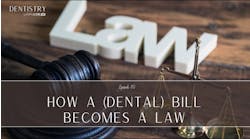by John Jameson, DDS
Dr. John Jameson recently spoke with Dr. Joe Steven, DDS. Dr. Steven is president of KISCO, a dental products marketing company that provides "new ideas for dentistry" to dental offices. Dr. Steven also is the editor of the KISCO Perspective Newsletter. Dr. Steven, along with Dr. Mark Troilo, presents the KISCO Seminar's "The $1,000,000 Staff" to dental offices and organizations across the country. Dr. Steven also presents a one day seminar called "Efficient-dontics." A full-time practitioner in Wichita, Kan., Dr. Steven is a member of the ADA, the Kansas Dental Association, and the Mid America Dental Study Group. You can reach Dr. Steven at (800) 325-8649, or email him at [email protected]. Visit the KISCO Web site at www. KISCOdental.com.
Dr. Jameson: How has your philosophy toward staff development evolved?
Dr. Steven: I have 10 brothers and sisters who are all self-employed business people. We all grew up working at our father's car wash and seat cover store. I remember when I was 6 years old, my first job was folding towels at the car wash.
So, I've been around the business world for years, and I gradually realized that the most effective way to motivate an employee was not through being a "hard-nosed boss" who belittles and "pulls rank" over that individual. Instead, I often observed that when the employer got on the same level as the employee and treated that person with respect and friendship, then that employee would give 110 percent to please the boss.
I still remember many times when my father would slip on a pair of rubber boots on a busy day and work side by side with the car wash crew helping with the rush of cars coming through. That kind of work ethic sets a good example and develops loyalty and dedication within the employees.
Dr. Jameson: What's the correlation between staff development and practice success?
Dr. Steven: I've often said that a dentist could have less than perfect skills, a poor location, and a not-so-desirable facility, but if he or she has a great staff that truly wins over the patients, that doctor will have a profitable practice.
This last point is the main theme behind our seminar, "The $1,000,000 Staff." Working with a great, motivated staff will generate tons of "word-of-mouth" new patient referrals from a doctor's existing patient base.
There is no need to spend thousands of dollars every month in advertising if you have a great staff that will help you build your practice.
Dr. Jameson: Is it the employee's responsibility to make development needs known, or should the dentist initiate it?
Dr. Steven: Ideally, the dentist should initiate it. But, I've seen many cases where that just doesn't happen. In those cases, it would be great for a highly motivated staff member to initiate steps to get things going in that direction. Some doctors will resent and reject this type of input. Others will welcome those employees with open arms and will benefit from it.
Dr. Jameson: Let's talk about the evolution of your "Million $ Staff" seminar. What inspired you to develop it? How does it help dentists?
Dr. Steven: Dr. Mark Troilo and I have been presenting "The $1,000,000 Staff" seminar for 14 years now. Mark and I wanted to present a seminar that truly could help every office regardless of the doctor's clinical expertise and/or personality. The philosophy behind our seminar is to lighten the load off of the doctor's shoulders and allow the staff to take care of the patients with excellent personal care and attention. We believe as doctors get busier, they need to delegate many of the public relation responsibilities to an excellent, personable staff. This allows the doctor to focus on dentistry. The staff, in turn, helps build the practice with excellent, friendly care of the patients. Doctors certainly have a role in practice promotion, but we feel the key is for the staff to bring in the patients, and let the dentist treat them.
We talk so much about trying to "win over" the patient, but doctors should adopt a similar attitude toward their staffs. So many dentists - and employers in general - have the attitude of, "You're just an employee - do what I tell you, and if you don't like it, hit the road!"
Mark Troilo and I meet staff members all of the time who tell us that their doctors don't know their husbands names, or how many children they have - even after working for them for 10 years or more! I find this very unfortunate.
My approach is that doctors need to "win over" their employees. Become friends with your staff! I realize this is a controversial position to take. Most business seminars and management experts recommend the opposite. But personally, I would rather develop a relationship and build real rapport with the individuals who will be helping me build a successful practice. Employees will perform better for a friend than for someone who is merely "the boss."
One way we've developed a real rapport with our employees is going on outings with them. We've traveled together to Las Vegas, Disney World, Cancun, and snowskiing trips, as well as local activities like golfing, water skiing, pool parties, etc. Both of our teams are already excited about our upcoming KISCO Cruise to Cozumel in January.
It's outside activities like these that help you get to truly know your employees as individuals. I've taken the relationships outside the normal confines of business. The result is a solid trust and commitment - not just to the practice, but also to each other.
I admit this is a hard sell for a lot of dentists. A friend of mine - a very successful dentist - once stated that he "doesn't want to see his staff in bikinis!" He just couldn't allow himself to blur the boundaries between business and friendship. That philosophy works well for him and many others; yet, I couldn't;t practice that way. You have to select a management style to fit your personality and beliefs.
Many dentists are entrepreneurs, and do a lot of things outside their practices. I'm no exception, and there are times when it's my staff that essentially is running my practice.
I have to add that my practice continues to thrive despite my inattention sometimes, and I owe it to a staff that gives 110 percent whether I'm mentally there or not. Because they are my friends as well as my employees, they are willing to take the extra steps necessary to ensure the practice succeeds.
Dr. Jameson: How would a new dentist successfully apply this philosophy?
Dr. Steven: The first thing a young practitioner must do is to have excellent systems in place; otherwise, this philosophy is setting the doctor up to be taken advantage of. Most important is a staff policies and procedures manual. Give it to your employees the day they arrive and have them sign a form stating they have read and understand it. Written job descriptions, so that employees are absolutely clear about their duties and responsibilities, are also essential. Having a firm structure in place gives employees the security of knowing where they stand in the grand scheme of things.
Dr. Jameson: What kinds of development (training, personal growth, etc.) opportunities do you recommend dentists provide their employees? How often?
Dr. Steven: The easiest way to start this development process is to start attending seminars such as ours as a team. Go see Cathy Jameson, Linda Miles, Naomi Rhode, and Connie Podesta. My staff loves all of these fantastic speakers and always leave those meetings feeling better about their careers and personal lives. They return with the kind of passionate motivation that helps improve our practice. Too often, we have doctors attend our meetings alone, only to tell us later that they regret not having their staff with them. We also have staff members attend without their doctors, and they also regret that their doctors weren't there. We all should be trying to develop a unified team - that's why it's important for everyone to attend together. I do realize that many doctors simply can't justify the cost of paying for everyone to attend. Yet, many of those doctors don't blink an eye when writing a $5,000 check for a Yellow Page ad or something similar. I'd put my money on the staff personal development seminars any day.
How often? It depends. If you've never ventured into this staff development arena, and you're really serious about it, then I would suggest getting a big adrenaline rush and attend three or four high-quality seminars right away. On the other hand, our office has been doing this for so long that we only attend one or two of these each year.
Dr. Jameson: How did the KISCO newsletter originate? How many subscribers do you have? Is staff development a frequent topic?
Dr. Steven: I began the KISCO Perspective newsletter four years ago after repeated requests from so many people who attended our seminars who wanted a monthly dose of motivation and other insightful tips for developing a successful practice. It was always a free, four page publication that went out only to our KISCO clients. But now, we've expanded it to a 24-page, magazine-style newsletter that goes out bimonthly to over 75,000 dentists. And, of course, staff development will be a repeated theme with many of the articles.
Dr. Jameson: You preach a philosophy that everyone - from the dentist to the part-time, front-desk person - is connected, and that the practice's success depends on everyone ... not just one or a few people.
Dr. Steven: Absolutely! We have an approach in our office - that everyone likes to have fun. So many offices just don't allow this. I think, for the most part, that dental staffs are joyous, fun-loving people, yet they work for doctors who insist on pulling rank, and who refuse to laugh or joke, and who talk to patients only about clinical matters. I think this is a huge mistake.
Too often, doctors overburden themselves by putting the success of the practice entirely on their own shoulders. What they really need to do is involve their staff and allow them to take over some of these responsibilities. Many times, it's a question of ego: doctors believe that their own importance far exceeds that of their staff, and therefore, the staff just cannot assume these duties. I consider myself a "molar mechanic" - it's my job to do dentistry, and I let my staff focus on patient relations.
By winning your staff members over, you will earn their loyalty. Doctors need to devote their energies primarily to dentistry, and let their staffs handle the secondary, supportive roles. Of course, the doctor also needs to be doing his or her share of "winning over the patients" as time allows. It helps when the doctor sets a good example. Become friends with your staff; take a personal interest in them as people. You will earn their loyalty, and they will give 110 percent.
One day, I walked into the treatment room. Two dental assistants were on either side of the patient who, despite the cotton swab sticking out of her mouth, was laughing uncontrollably. "Oh my gosh," she gasped, "I just love it here!" I have to admit, I didn't even recognize her, and I had to look at her chart to recall her name. It proved to me that she was excited about our practice because of my great staff and not necessarily me.
Dr. Jameson: What kinds of challenges do you think dentists face when it comes to staffing and development?
Dr. Steven: Unfortunately, the challenges facing dentists now and in the future are much different than they were when I started practicing 24 years ago, especially in regards to staffing. We are all aware of how difficult it is to hire and retain qualified employees. The work ethic of years past is sadly missing with much of the younger work force.
That's why it is even more important now than before to strive for great staff development. The old philosophies of the "slave driver boss" simply don't work with today's work force. (I'm not sure they ever did anyway!) Today's employees have many more options than yesteryear, and, in many cases, with greater benefits. In Wichita, the air capital of the world, dentists and other businesses are constantly losing good employees to the huge aircraft industries that offer fantastic benefits. But these industries can never match the great intangible benefits that a small business owner, such as a dentist, can offer when we practice under the philosophy that we discuss at our seminars. Plus, it's a lot more fun when we work with loyal friends who constantly help promote our business.
Dr. Jameson: In your opinion, will modern challenges - managed care, sluggish economy, aging population, predicted shortage of general dentists - affect the way dentists view staffs and development?
Dr. Steven: I would hope so. I've been fortunate over the years to not have to get in bed with managed-care programs other than Delta and Blue Cross (we don't participate with Blue Cross as of two years ago.) Without a doubt, the first move to make if you are trying to phase out of managed care is to generate new patient referrals through good word-of-mouth exposure from your existing patients.
But the doctor can't do this alone. Once again, it's the personable, friendly staff that will make the difference. That's the simplest way to overcome any obstacle that faces our profession. Once we have an abundant supply of new patients, our options and opportunities will only increase.





